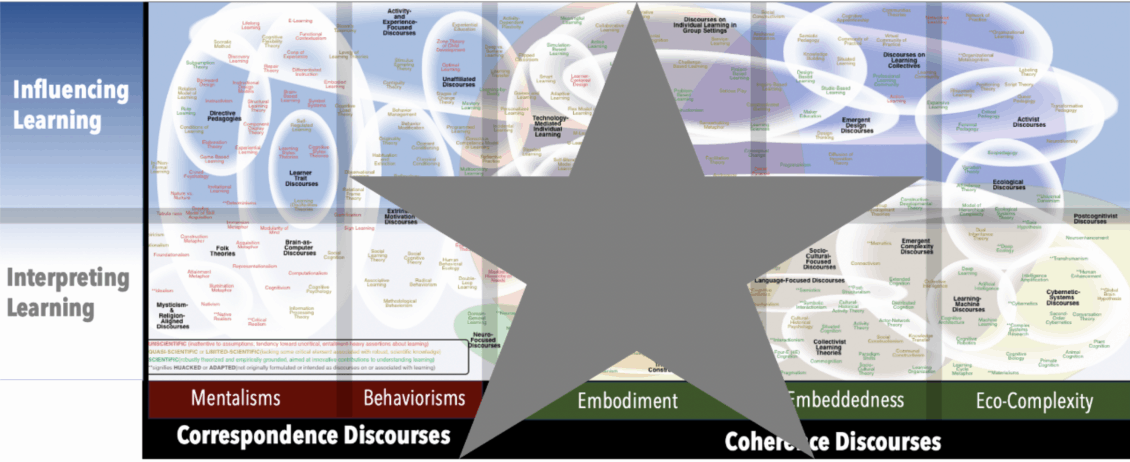Focus
Interpreting learning in terms of movement along a groove or trackPrincipal Metaphors
- Knowledge is … a territory/area/domain/field
- Knowing is … attaining a goal
- Learner is … one capable of moving (individual)
- Learning is moving (arriving at, reaching, progressing, accomplishing, achieving)
- Teaching is … leading, guiding, directing, facilitating
Originated
AncientSynopsis
The Path-Following Metaphor is evident in such phrases as “moving along,” “making progress,” “getting somewhere,” “setting goals,” “looking ahead,” and so on. In fact, the metaphor is intricately knitted into everyday English and ubiquitous across many of the defining structures of modern schooling: For example:- the original meaning of the word curriculum was “a path followed”;
- a schooling experience framed in terms of curriculum necessitates regular reports on progress (from the Latin pro + gradi “forward step”);
- those progress reports are typically graded (from the Latin gradus “pace; gait; step climbed”);
- the original meaning of the word education had to do with “pulling along” or “drawing out” (see the Definitions page for more detail).
- Ladder of Learning (Learning Ladder) – in its most-common use, a metaphor in which learning is seen in terms of progress up the rungs of a ladder – and, so, often used to sequence the subskills deemed necessary to attain some sort of mastery. (Although relying on a different image than the Path-Following Metaphor, the implications and associations are very similar.) Other usages include:
- an informal name for the Conscious Competence Model of Learning, and
- a commercial digital platform that provides parents and teachers a suite of tools to support children’s learning
- Path Dependence – the recognition, articulated in terms of the Path-Following Metaphor, that all one’s current learning is dependent on one’s previous learning
Commentary
The English word “learn” is derived from the Proto-Indo-European root -lois “furrow, track.” That is, the Path-Following Metaphor is an originary notion in English-based discussions of learning. While it might be tempting to believe that this original meaning has eroded over time, in fact it is vibrantly maintained in a net of associations that that entangles concordant metaphors of learners, teaching, teachers, and education along with structures and practices that define modern schooling. For example, a track-based, course-following conception of learning summons and supports a conception of the learner as an entity-in-motion along a trajectory – and that entity may be quick or slow, motivated or recalcitrant, ahead or behind, toeing the line or wayward. These notions are rendered sensible against an image of knowledge as a mapped-out field, area, or domain that is traversed by well-marked courses/curricula. And, correspondingly, teaching here is conceived as planning those courses and keeping learners on track, which entails leading, guiding, directing, and orienting.Authors and/or Prominent Influences
DiffuseStatus as a Theory of Learning/Teaching
The Path-Following Metaphor is invoked within both Correspondence Discourses and Coherence Discourses – that is, it appears along the entirety of our map’s horizontal axis. It is also as prominent among discourses on influencing learning (i.e., teaching) as it is among discourses on interpreting learning – meaning that it spans our vertical axis as well. Concisely, while the Path-Following Metaphor is most often articulated as a principle of learning, can be construed to be as much about teaching as it about learning.Status as a Scientific Theory
As it is more a principle than a theory or discourse, efforts to assess the scientific status of the Path-Following Metaphor only make sense within the discourses in which it is invoked – that is, and with some irony, in terms of the ways it is used in association with other principles.Subdiscourses:
- Ladder of Learning (Learning Ladder)
- Path Dependence
Map Location

Please cite this article as:
Davis, B., & Francis, K. (2025). “Path-Following Metaphor” in Discourses on Learning in Education. https://learningdiscourses.com.
⇦ Back to Map
⇦ Back to List
